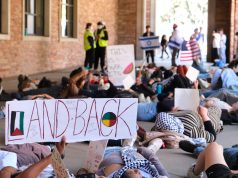Nearly 70 people decided to forego the Oscars Sunday evening in favor of hearing Dana Golan speak about the experiences of young female Israeli soldiers stationed in the occupied territories of the West Bank.
Golan, herself a former lieutenant in the Israel Defense Forces, now works as the executive director of the nonprofit group Breaking the Silence, which has been working to inform the public about the realities of military occupation since 2004.
Founded by former soldiers with money received from the IDF at the completion of their compulsory service, Breaking the Silence has collected testimonies from more than 700 soldiers who have served since the beginning of the Second Intifada, the period of intensified Israeli-Palestinian violence that began in September 2000. The testimonies describe the difficult, dehumanizing and often brutal atmosphere soldiers encountered while serving in occupied cities, and the silence that faces them once they return to civilian life.
“We believe the soldiers that were sent there by their own society, by their own family, these are the people that have to speak up later,” Golan said.
Boulder is the latest stop on Golan’s tour across the U.S. to publicize the latest publication from Breaking the Silence, a book of testimonies from female IDF soldiers. The book, which is available on the group’s website (www.breakingthesilence.org.il), contains 96 testimonies from women who served as combatant soldiers, medics, scouts and officers, as well as in other roles. With this tour and publication, Golan said, Breaking the Silence continues to question whether the “moral cost of occupation” is too high.
The majority of Sunday’s presentation was a screening of the documentary “To See If I’m Smiling,” which includes interviews with four women who have worked with Breaking the Silence. The award-winning film chronicles the experiences of six female soldiers who served their two years of compulsory military service in occupied territories.
Golan said she spent seven months of her own military service in the divided city of Hebron, one of the most turbulent areas in the West Bank. She described her experiences as an education officer trying to survive the “Wild West” atmosphere of violence, chaos and moral uncertainty.
After the film, Golan took questions from audience members, who ranged from simply curious to passionately divided. Some, like Charlie and Debbie Springer, had visited Israel and Palestine with an ecumenical religious foundation. Debbie said that she and her husband attended the talk to learn more about both sides of the conflict. “We keep trying to educate ourselves,” she said. Both Springers also expressed concern that the issue is not as high a priority as it should be, and that “our [political] leaders are one-sided.”
Some audience members identified themselves as firmly “pro-Israel,” or “pro-Palestine,” and some said they simply wanted to hear stories from someone who had been involved in the conflict personally, “not just something that came from a reporter,” as one audience member said.
When asked what could be done to resolve the conflict, particularly the violence in Hebron, Golan declined to offer her opinion. The goal of Breaking the Silence, she said, is to show civilians what is happening “on the ground” and what soldiers live with in the aftermath.
“What we are trying to do is put the mirror in front of each one of you and to tell you, ‘This is what you look like.’”














































